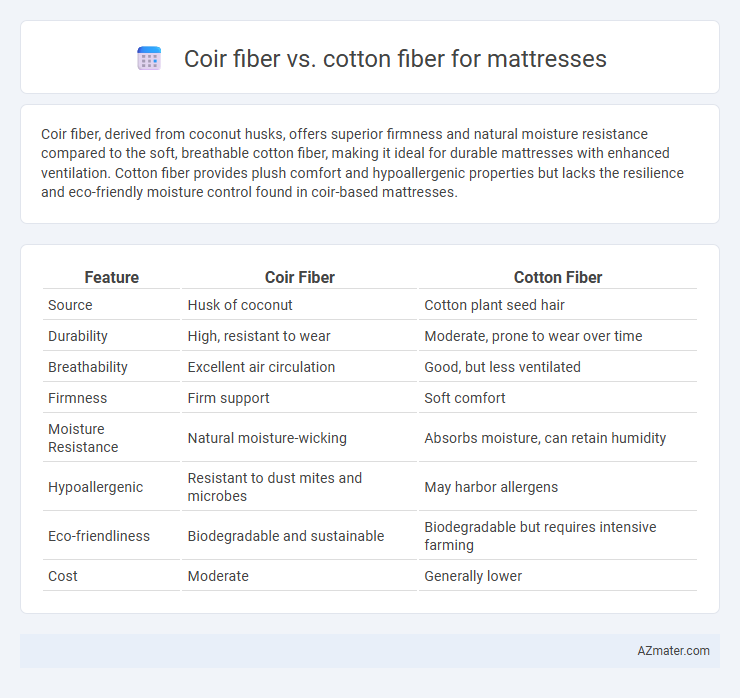Coir fiber, derived from coconut husks, offers superior firmness and natural moisture resistance compared to the soft, breathable cotton fiber, making it ideal for durable mattresses with enhanced ventilation. Cotton fiber provides plush comfort and hypoallergenic properties but lacks the resilience and eco-friendly moisture control found in coir-based mattresses.
Table of Comparison
| Feature | Coir Fiber | Cotton Fiber |
|---|---|---|
| Source | Husk of coconut | Cotton plant seed hair |
| Durability | High, resistant to wear | Moderate, prone to wear over time |
| Breathability | Excellent air circulation | Good, but less ventilated |
| Firmness | Firm support | Soft comfort |
| Moisture Resistance | Natural moisture-wicking | Absorbs moisture, can retain humidity |
| Hypoallergenic | Resistant to dust mites and microbes | May harbor allergens |
| Eco-friendliness | Biodegradable and sustainable | Biodegradable but requires intensive farming |
| Cost | Moderate | Generally lower |
Introduction to Mattress Fiber Choices
Coir fiber, derived from coconut husks, offers natural durability and excellent breathability, making it an eco-friendly mattress option that provides firm support and moisture regulation. In contrast, cotton fiber, known for its softness and hypoallergenic properties, enhances mattress comfort through breathability and temperature control but tends to retain more moisture compared to coir. Choosing between coir and cotton fibers depends on prioritizing factors like firmness, moisture wicking, natural resistance, and environmental sustainability in mattress construction.
What is Coir Fiber?
Coir fiber is a natural, durable material extracted from the husk of coconut shells, widely used in mattresses for its excellent breathability and moisture resistance. Unlike cotton fiber, which is soft and highly absorbent, coir fiber offers superior firmness and support, making it ideal for eco-friendly, hypoallergenic mattress variations. The coarse texture of coir enhances airflow, regulating temperature and reducing allergens, which benefits sleepers seeking a cooler and healthier sleep environment.
What is Cotton Fiber?
Cotton fiber, derived from the seed hairs of the cotton plant, is a natural, breathable material known for its softness and moisture-wicking properties, making it popular in mattress construction. It provides excellent ventilation and comfort by regulating temperature and absorbing humidity, which enhances sleep quality. Compared to coir fiber, cotton offers a gentler feel but may require more maintenance due to its susceptibility to mold and mildew in humid environments.
Coir Fiber: Key Properties and Benefits
Coir fiber, derived from coconut husks, offers exceptional durability and natural resilience, making it ideal for mattress applications requiring firm support and longevity. Its inherent breathability and moisture-wicking properties enhance airflow, promoting a cooler and more hygienic sleeping environment compared to cotton fiber. Additionally, coir fiber's resistance to mold, dust mites, and allergens provides significant health benefits, especially for individuals with respiratory sensitivities.
Cotton Fiber: Key Properties and Benefits
Cotton fiber in mattresses offers exceptional breathability and moisture-wicking properties, making it ideal for temperature regulation and a dry sleeping environment. Its natural softness and hypoallergenic nature enhance comfort and reduce the risk of skin irritation or allergies. Unlike coir fiber, cotton provides superior cushioning and a plush feel, contributing to overall mattress comfort and support.
Durability: Coir vs Cotton in Mattresses
Coir fiber exhibits superior durability compared to cotton fiber in mattresses due to its natural resilience and resistance to wear and tear, lasting up to 8-10 years under regular use. Cotton fiber, while softer and more breathable, typically degrades faster, often requiring replacement within 3-5 years because of its susceptibility to compression and moisture retention. The high lignin content in coir contributes to its robustness, making it a preferred choice for long-lasting mattress cores.
Comfort Levels: Coir vs Cotton Mattresses
Coir fiber mattresses offer firm support with excellent breathability, making them ideal for people who prefer a solid sleeping surface that stays cool and dry. Cotton fiber mattresses provide a softer, more cushioned feel that contours gently to the body, enhancing comfort for side sleepers and those seeking a plush sleep experience. Choosing between coir and cotton fibers depends on individual comfort preferences and specific sleep needs related to support and softness.
Breathability and Moisture Control
Coir fiber offers superior breathability due to its naturally coarse texture, allowing for enhanced airflow within the mattress, which helps regulate temperature and prevent heat buildup. Cotton fiber, while soft and comfortable, retains more moisture and can trap heat, making it less effective at moisture control compared to coir. Mattresses incorporating coir fiber often provide better moisture-wicking properties, reducing the risk of mold and mildew, especially in humid environments.
Eco-Friendliness and Sustainability Comparison
Coir fiber, derived from coconut husks, is a highly sustainable and biodegradable material widely used in mattresses due to its natural resistance to mold and durability. Cotton fiber, while natural and biodegradable, typically requires more water and pesticides during cultivation, impacting its overall eco-friendliness. Choosing coir fiber for mattresses reduces environmental impact by utilizing agricultural waste and promoting renewable resources, making it a greener alternative to conventional cotton fiber.
Choosing the Right Fiber: Coir or Cotton Mattress
Coir fiber offers natural durability and excellent ventilation, making it ideal for firm mattresses that resist moisture and allergens. Cotton fiber provides superior softness and breathability, enhancing comfort and temperature regulation in medium to soft mattresses. Choosing the right fiber depends on your preference for firmness, breathability, and hypoallergenic properties, with coir suited for firm support and durability, while cotton excels in cushioning and softness.

Infographic: Coir fiber vs Cotton fiber for Mattress
 azmater.com
azmater.com